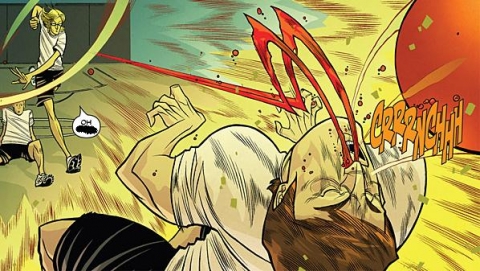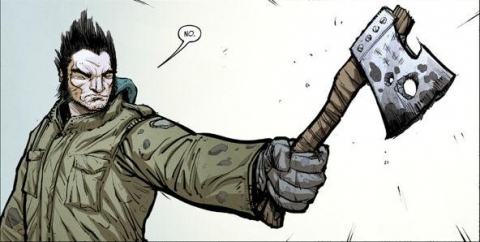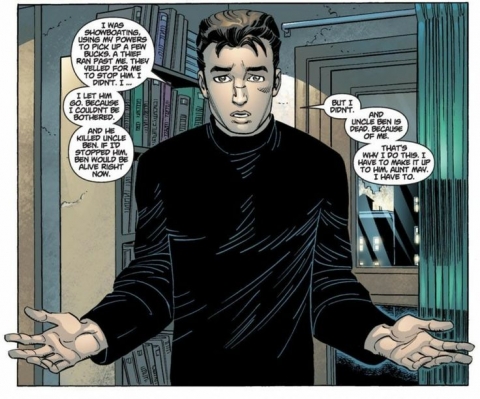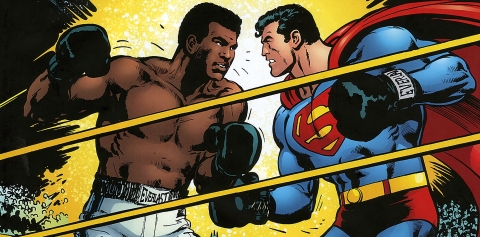52 weeks. 52 different writers. 2 trade paperbacks or hardcovers a week. Each week I’ll take a look at a different writer and read two different collected editions from within that person’s repertoire to help in the examination of their work.
Did you know if you google “Justin Jordan” for some info the first thing that comes up is another Justin Jordan who just so happens to be Michael Jordan’s nephew? Neither did I until today, which is pretty cool because who doesn’t love Jordan and the Bulls? Anyways, back to the Justin Jordan who writes comics. Justin was nominated for a Harvey Award back in 2012 for “Most Promising New Talent” and is perhaps most well-known for his contributions to DC Comics during their New 52 relaunch, working on titles like Deathstroke, Team 7, Superboy, and Green Lantern: New Guardians. None of that really matters though because he is way more well-known for writing today’s crazy, hyper violent, and all around awesome series, “The Strange Talent Of Luther Strode”.
The Strange Talent Of Luther Strode
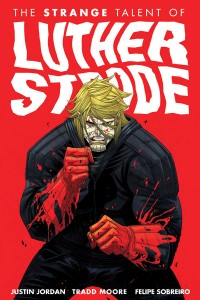 Luther Strode is your average high school student, with an affinity for comics, video games, and other staples of “nerd culture”. A scrawny kid who is constantly getting bullied, Luther decides that he’s had enough and gets a book mailed out to him that will help him increase his strength, spirit, and mind. Luther gains exceptional skills seemingly overnight like heightened strength, speed, and durability just to name a few. The book has turned him quite literally into a man of exceptional and unrealized power. As Luther learns more about his powers he turns to vigilantism to try to use his powers for good, even though his raw strength is a dangerous thing. Meanwhile, an equally capable and dangerous man named the Librarian begins to gruesomely murder citizens of Luther’s town, tearing a path towards an inevitable clash with Luther. Little does Luther know that the Librarian has a tight tie to his own powers and seeks him out for unusual reasons. Luther’s life quickly shifts to him using his powers to try to defeat the Librarian whilst also protecting the ones he loves most.
Luther Strode is your average high school student, with an affinity for comics, video games, and other staples of “nerd culture”. A scrawny kid who is constantly getting bullied, Luther decides that he’s had enough and gets a book mailed out to him that will help him increase his strength, spirit, and mind. Luther gains exceptional skills seemingly overnight like heightened strength, speed, and durability just to name a few. The book has turned him quite literally into a man of exceptional and unrealized power. As Luther learns more about his powers he turns to vigilantism to try to use his powers for good, even though his raw strength is a dangerous thing. Meanwhile, an equally capable and dangerous man named the Librarian begins to gruesomely murder citizens of Luther’s town, tearing a path towards an inevitable clash with Luther. Little does Luther know that the Librarian has a tight tie to his own powers and seeks him out for unusual reasons. Luther’s life quickly shifts to him using his powers to try to defeat the Librarian whilst also protecting the ones he loves most.
On the surface, Justin Jordan’s “The Strange Talent Of Luther Strode” shares a lot of similarities with Mark Millar’s “Kick-Ass”, but rest assured that in the end both stories end up being wildly different, with Luther Strode straddling the line of the over-the-top comic book world far more proudly. In some regards, I’d go as far as saying that “The Strange Talent Of Luther Strode” is “Kick-Ass” on bath salts with superpowers and tons of hyper violence. The crazy, hyper violent nature of the series is classic Justin Jordan as that man loves to do insanely bloody stories that are less serious and more ridiculous than your average comic. To put things into perspective, you get scenes where men get their faces ripped off, severed arms shoved down their throats, and….well honestly some of this is just better seen than read as it’s part of what makes Luther Strode a ridiculously fun story to follow along with.
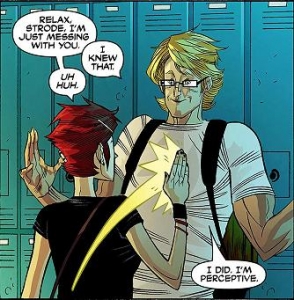 One of the biggest blessing and curses that Strange Talent deals with is how incredibly cliché it ends up being. The plot feels derivative of tales done before, with just about every major story beat being predictable. Everything feels telegraphed, save for maybe two to three moments that play out in a way different from what you expected and thus they surprise you. I guess that’s where the triumph occurs with Strange Talent, in that it becomes so easy to guess what will happen that, in the rare instances where the story swerves, you are genuinely surprised. Even with the story being fairly straight forward and predictable, there’s still fun to be had. Jordan scripts out a fast, hyper violent pace that makes things fun for you as a reader, causing you to be more forgiving in instances when you know exactly what will happen. In placing this hyper violence into the story, Jordan actually fools around with the superhero genre a bit more than what you’d expect. This is still a different style of take on your average superhero story as Luther isn’t your average hero, Librarian isn’t your average villain, and all around your supporting characters are just different from your average superhero story. Everything seems to bust out in fast forward, as all the events of the stories just read so quickly and fluidly that you’ll rip through this story in one sitting with ease. The fast pace keeps you from growing bored with the plot, with the craziness of what’s happening around these characters doing nothing if not complimenting the pace perfectly. As such, even though you can see things coming a mile away, by the time you reach the final two to three pages of this series you can still walk away being thoroughly entertained and even slightly surprised by the way things shook down.
One of the biggest blessing and curses that Strange Talent deals with is how incredibly cliché it ends up being. The plot feels derivative of tales done before, with just about every major story beat being predictable. Everything feels telegraphed, save for maybe two to three moments that play out in a way different from what you expected and thus they surprise you. I guess that’s where the triumph occurs with Strange Talent, in that it becomes so easy to guess what will happen that, in the rare instances where the story swerves, you are genuinely surprised. Even with the story being fairly straight forward and predictable, there’s still fun to be had. Jordan scripts out a fast, hyper violent pace that makes things fun for you as a reader, causing you to be more forgiving in instances when you know exactly what will happen. In placing this hyper violence into the story, Jordan actually fools around with the superhero genre a bit more than what you’d expect. This is still a different style of take on your average superhero story as Luther isn’t your average hero, Librarian isn’t your average villain, and all around your supporting characters are just different from your average superhero story. Everything seems to bust out in fast forward, as all the events of the stories just read so quickly and fluidly that you’ll rip through this story in one sitting with ease. The fast pace keeps you from growing bored with the plot, with the craziness of what’s happening around these characters doing nothing if not complimenting the pace perfectly. As such, even though you can see things coming a mile away, by the time you reach the final two to three pages of this series you can still walk away being thoroughly entertained and even slightly surprised by the way things shook down.
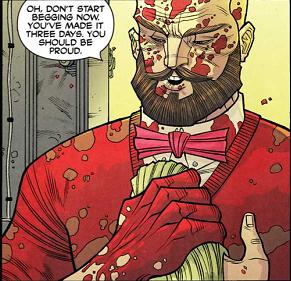 With my primary criticism of the plot being its predictability, it’s unsurprising that the same pitfalls occurs in the character department as well unfortunately. Even still, Justin Jordan has a handful of main players in this story and for the most part all of the characters he has available to him are fun characters to read about. Luther Strode is the hero of the story, going from scrawny geek to buff, physical powerhouse over the course of six fast issues. He’s a character that starts out with a selfish motivation to better himself and remains quite selfish, although likable for all of the story. Luther becomes a character constantly reacting to everything that’s happening around him, making him a “weak” character by writing standards but one who you still can’t help but like. He has a charm and wit to him that makes you cheer for him even though he lacks clear, unselfish motivations for almost all of the story. His best friend, Pete, is the comedic backbone of the series, grounding out the cast and providing plenty of hilarity along the way. Although he isn’t integral to the overall narrative, he’s still a character that this story would sorely miss if he wasn’t present at all. The comedic timing of the character helps to push the quick pace of the story, constantly keeping the ball rolling with forward momentum. Petra is Luther’s love interest who is definitely the furthest thing from a shy girl. She aggressively pursues a romantic relationship with Luther, much to his delight, and is yet again another addition to the cast who isn’t overly important but still necessary for the feel of the series in this volume. She’s got a past with a big question mark beside it, something that doesn’t get fleshed out as cleanly as it should, leaving much more to be implied than resolved. Luther’s mother also becomes a fairly important character in the story, being there to primarily shine light on Luther’s past and give you a reason to feel a bit of heartbreak towards the lead character. Even with that in mind, her inclusion is still fairly flat and doesn’t do much for the story until much later on.
With my primary criticism of the plot being its predictability, it’s unsurprising that the same pitfalls occurs in the character department as well unfortunately. Even still, Justin Jordan has a handful of main players in this story and for the most part all of the characters he has available to him are fun characters to read about. Luther Strode is the hero of the story, going from scrawny geek to buff, physical powerhouse over the course of six fast issues. He’s a character that starts out with a selfish motivation to better himself and remains quite selfish, although likable for all of the story. Luther becomes a character constantly reacting to everything that’s happening around him, making him a “weak” character by writing standards but one who you still can’t help but like. He has a charm and wit to him that makes you cheer for him even though he lacks clear, unselfish motivations for almost all of the story. His best friend, Pete, is the comedic backbone of the series, grounding out the cast and providing plenty of hilarity along the way. Although he isn’t integral to the overall narrative, he’s still a character that this story would sorely miss if he wasn’t present at all. The comedic timing of the character helps to push the quick pace of the story, constantly keeping the ball rolling with forward momentum. Petra is Luther’s love interest who is definitely the furthest thing from a shy girl. She aggressively pursues a romantic relationship with Luther, much to his delight, and is yet again another addition to the cast who isn’t overly important but still necessary for the feel of the series in this volume. She’s got a past with a big question mark beside it, something that doesn’t get fleshed out as cleanly as it should, leaving much more to be implied than resolved. Luther’s mother also becomes a fairly important character in the story, being there to primarily shine light on Luther’s past and give you a reason to feel a bit of heartbreak towards the lead character. Even with that in mind, her inclusion is still fairly flat and doesn’t do much for the story until much later on.
As far as antagonists go, Justin Jordan introduces the readers to a single primary villain with hints towards much more in the works. The Librarian is a well-kept gentleman who is built like an ox and comes off as a polite powerhouse. He’s a man tightly tied to Luther’s new powers and comes off as quite the psychopath when you peel back the layers of the character. Although he isn’t anything special, the Librarian is still an important “first test” for Luther on his path towards becoming a “hero”, serving to be an appropriate challenge who pushes Luther physically, emotionally, and mentally in ways that he hasn’t been pushed since gaining said powers. There appears to also be some form of organization working behind the Librarian, pushing some form of mysterious and unspoken agenda. If nothing else, this group supports the fact that Justin Jordan clearly has a long game in place for the future of the series beyond this first volume.
Collects: The Strange Talent Of Luther Strode #1-6.
Best Character: Luther Strode.
Best Line Of Dialogue/Caption: “My name is Luther Strode, and I have talents. I know the secrets now. I know what is inside.” – Luther Strode.
Best Scene/Moment: The Luther and Librarian showdown – Issue 6.
Best Issue: Issue 2. I’m going to go with issue 2 because this is where we see Luther really starting to develop with his new-found “powers”. There’s plenty of hilarious moments in this issue that stays consistent with the lighter first half of this volume before it inevitably switches to some darker subject matter during the second half. We watch as Luther deals with the high school bully a bit more and get our first glimpse at him using his powers to commit a deed that is actually good. It’s fast paced, highly enjoyable, and there’s a bit of hyper violence sprinkled in for good measure.
Why You Should Read It: You should read this if you just want a fast paced, fun, and hyper violent comic. The Strange Talent Of Luther Strode is so ridiculous that you can’t deny the enjoyment you’ll find it in. It’s a superhero story without any restraints, showcasing the steps someone would take when given that power to do good. Justin Jordan theorizes that just because you get powers doesn’t mean it’s easy to do the right thing. As he states in the foreword to this volume “Have you really helped or made things worse?”, and that seems like a fitting question to ask after reading this first volume in the series. No, this comic isn’t a deep philosophical examination of a hero who gets powers he doesn’t know how to control too quickly. It’s something that’s touched on but for the most part “The Strange Talent…” is just rip-roaring fun and highly violent. If nothing else, it’s sure to scratch the itch of any comic fan who wants a light read with tons of action, laughs, and plenty of bloody nonsense.
Spread Volume 1: No Hope
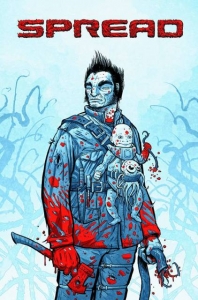 Justin Jordan is a relative newcomer to the comic industry. Jordan began breaking into the industry following the success of the release of his Image Comics title, “The Strange Talent Of Luther Strode”. With a skill for writing characters and plots, Jordan is perhaps most well-known for working with colourist Felipe Sobreiro to create truly hyper violent comic book series. Jordan’s style of writer doesn’t necessarily call for the most gratuitous types of violence, instead treating the violence in his comic books as playful and being immediately distinct as well as recognizable. Having already released plenty of hit series, Justin Jordan is a writer to keep your eye on within the creator owned network of the comic industry.
Justin Jordan is a relative newcomer to the comic industry. Jordan began breaking into the industry following the success of the release of his Image Comics title, “The Strange Talent Of Luther Strode”. With a skill for writing characters and plots, Jordan is perhaps most well-known for working with colourist Felipe Sobreiro to create truly hyper violent comic book series. Jordan’s style of writer doesn’t necessarily call for the most gratuitous types of violence, instead treating the violence in his comic books as playful and being immediately distinct as well as recognizable. Having already released plenty of hit series, Justin Jordan is a writer to keep your eye on within the creator owned network of the comic industry.
A decade ago, a strange symbiote like infection simply referred to as “The Spread” began to overtake the Earth. This virulent strand spread quickly, infecting humans, plants, and animals, turning them into twisted caricatures of life. The humans, having now established safe zones, managed to slow the Spread to a crawl but its threat still looms largely over a crippled society. Human life has changed immensely, with humans becoming more scavenger like and doing whatever it takes to survive. No is one of these scavengers, being a stoic but hardened member of this new world. No’s life suddenly changes when he stumbles across a dying woman in the middle of the snow, urging him to “find Hope”. Initially, No is confused by this plea before quickly discovering that the woman had a baby who was kidnapped by other scavengers. The baby, whose name is Hope, appears to be just like any other child until the Spread attacks No and these scavengers, revealing that the baby’s tears actually kill the Spread. No and Hope set together to survive against the hordes of the Spread and villainous scavengers along the way.
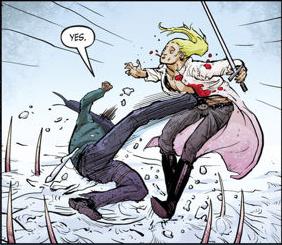 Justin Jordan teams with co-creator Kyle Straham to bring the world “Spread”, a crazy action/horror series that treads new ground in the comic industry. Brought to the table is a ridiculous, 80’s action and horror story slammed together at high speeds, creating a gruesome, vile, exciting, fast paced, and ridiculously fun story. Justin Jordan and Kyle Straham just hit the right stride with this sort of series, never taking things too seriously but still providing the reader with something to feel threatened by. With Kyle Straham being not only a co-creator but the artist on this series as well you get a strong sense that in working with Jordan both men have the direction they want to head in fairly ironed out, which really does allow these stories to bloom as time progresses. Together the two men find the perfect balance between having a chilling horror story where you feel as though you’re constantly being stalked, never feeling safe, and an action story wherein massive set pieces and epic battles can take place.
Justin Jordan teams with co-creator Kyle Straham to bring the world “Spread”, a crazy action/horror series that treads new ground in the comic industry. Brought to the table is a ridiculous, 80’s action and horror story slammed together at high speeds, creating a gruesome, vile, exciting, fast paced, and ridiculously fun story. Justin Jordan and Kyle Straham just hit the right stride with this sort of series, never taking things too seriously but still providing the reader with something to feel threatened by. With Kyle Straham being not only a co-creator but the artist on this series as well you get a strong sense that in working with Jordan both men have the direction they want to head in fairly ironed out, which really does allow these stories to bloom as time progresses. Together the two men find the perfect balance between having a chilling horror story where you feel as though you’re constantly being stalked, never feeling safe, and an action story wherein massive set pieces and epic battles can take place.
The masterful blending of two genres isn’t the only thing Justin Jordan and Kyle Straham should be applauded for. One of the most enjoyable parts of this first volume of “Spread” has to be the world that these two creators build for the duration of this tale. Spread is set in an almost desolate, winter setting reminiscent (to my mind anyways) of the cult horror film, “The Thing”. The humans who have survived the initial wave of the Spread now have to try to survive against not only the elements of the world but fellow survivors as well. Jordan and Straham essentially show us a crippled section of the world, implying that the rest of the world may be worse for wear as well but not showing the reader yet to create a sense of suspense and anticipation in the reveal of other locations. They eliminate the availability for almost all forms of transportation early on in the story, giving us a world better suited for horses than conventional travel like cars, planes or boats. Communities still seem to be an important part of the world, as scavengers gather together in well fortified areas for trading and survival. These areas do showcase how primitive life has become, with the “safe places” being grounds for germs, diseases, and low standards of living. You truly get the sense of isolation and desperation from the duo of creators as they hammer home time and time again how harsh the world has seemingly become, showing the reader that between the bands of evil scavengers and the Spread, this is a world you wouldn’t want to get stuck in.
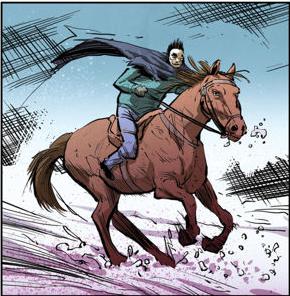 In terms of characters, you only get a handful of primary players from Jordan and Straham. The primary protagonist of the tale is a rather simple man referred to as “No”. At first glance this appears to be a peculiar name for a hero but as you climb through No’s story you realize the name is fitting due to the fact that his dialogue consists predominately of the word “no”. No is a character who is short on dialogue and character development but not awesomeness as he is most certainly
In terms of characters, you only get a handful of primary players from Jordan and Straham. The primary protagonist of the tale is a rather simple man referred to as “No”. At first glance this appears to be a peculiar name for a hero but as you climb through No’s story you realize the name is fitting due to the fact that his dialogue consists predominately of the word “no”. No is a character who is short on dialogue and character development but not awesomeness as he is most certainly
your typical strong but silent hero who doesn’t mix words and would rather lob the heads off the enemies who stand in his way. As a result you do get a rather flat hero to this story but when you get past the fact that No’s development isn’t really the point it’s easy to rectify the boring lead who will give you plenty of moments that flare up in action. Hope and Molly are the two other secondary protagonists, with Hope being the baby savior of this horrible world and Molly being her “mother”. Hope is an interesting character in the sense that she narrates the story from a future perspective, being the narrator to the series even though she is still an infant. She adds an immediate sense of interest to the series, being a physical weapon No can use to battle the hordes of the Spread as her tears and saliva seem to hold some form of property that allows for the immediate destruction of any Spread the bodily fluids touch. With Hope, No’s adventures become fascinating as she makes you want to know more about her and how No will use her. One question I’m sure that will cross reader’s minds is “What will happen as she ages and become a child who doesn’t cry on demand?”. If Hope is the interesting cast member and No is the unsung, one-note hero than Molly is simply the crazy one. Molly is introduced in an odd way early on and only becomes weirder as the plot trudges along. She becomes a great piece for Jordan and Straham to use to allow No some freedom, making Molly become Hope’s “mother”. In doing so Hope can be pawned off on Molly to give No the ability to go into battle without worry of having an infant strapped to his chest. Even though Molly is largely a mother figure to Hope she still has plenty of peculiar quirks that make her a more odd member to the cast.
As I pointed out when talking about the primary heroes of the story, the series is narrated through the perspective of an aged Hope, recollecting events with some hindsight. It’s a storytelling style that is becoming more common in comics thanks to series like “Saga”, with Jordan and Straham using the child to tell the story convincingly. It’s always a pleasure to read how a character recalls an event and get their input on how things went or how they would’ve done things differently. This style of narration allows for plenty of foreshadowing, a great tool used by the creators to help build anticipation for future plot points. Jordan and Straham seem to have some semblance of a long game in mind, helping to make the reader feel a little more comfortable in knowing that the story will go somewhere beyond having No cart around a child saviour across the crippled Earth. Jordan and Straham actually develop a few key antagonists in this first volume as well, introducing the human Ravello, an evil man who leads plenty of scavengers, as well as playing up the idea of the Spread being a villain but also part of the world. All around, Jordan and Straham do an excellent job of placing plenty of building blocks for the future of this series, laying tons of ground work that will payoff for anyone who commits to this series.
Collects: Spread #1-6.
Best Character: Fat Jack.
Best Line Of Dialogue: “No.” – No.
Best Scene/Moment: No discovers the use for Hope – Issue 1.
Best Issue: Issue 5. The fifth issue of this collection is largely the climax of the first arc, with the issue afterwards dealing with the descending action and consequences of choices. All the primary characters are maneuvered into difficult and seemingly losing positions with few options for victory. In my opinion, the best writing always happens when you write a character into a corner and show how they fight their way out. Weak writers will write these characters into a corner and then proceed to kill them but here Jordan and Straham resist the urge to just kill everyone, instead making compelling and tension riddled moments for readers to enjoy. What you’re left with is plenty of action, excitement, drama, and an ending that makes you immediately start reading the next issue to see how everything will conclude.
Why You Should Read It: It’s hard to find a lot of good horror comics in my opinion. With the exception of a few writers, a lot creators in the comic medium have a hard time striking the right balance that they need to when it comes to horror. With Spread, Justin Jordan and Kyle Straham draw on 1980’s film influences to give you a comic book that I think will be the equivalent of a “cult classic” in ten years. The style is impeccable, feeling like a beautiful blend between the horrific elements of John Carpenter’s “The Thing” and the action feel of “Predator”. If you were a child of the ’80’s I imagine this series will have an odd sense of nostalgia to it. If you want a series that is over-the-top with action and horror then sink your teeth into “Spread”. It’s a little dirty, kind of vulgar, but pretty awesome when all is said and done.

